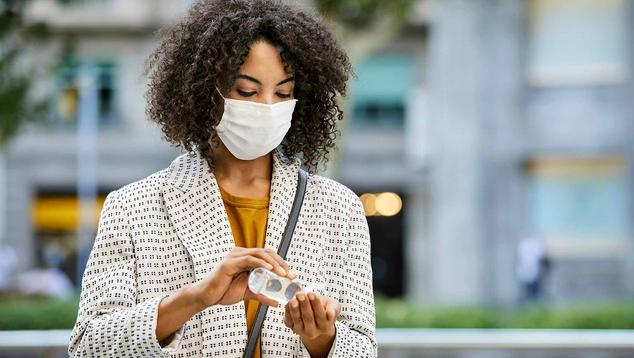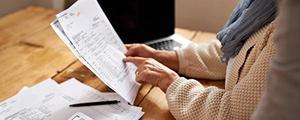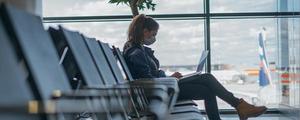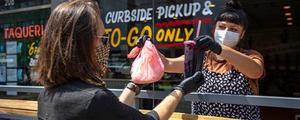Story Highlights
- Eight in 10 Americans "highly likely" to wear masks in public tomorrow
- Those who do not wear masks less certain of asymptomatic spread
- Mask users less likely to feel negative reactions from friends or family
Editor's Note: The research below was conducted in partnership between Franklin Templeton and Gallup.
WASHINGTON, D.C. -- Despite ongoing debate over the politicization of face mask use, the vast majority of Americans -- 80% -- now say they would be highly likely to wear a mask tomorrow if they were out of their house and in an indoor space. Democrats are somewhat more likely than Republicans, 87% to 74%, to say they would be highly likely to wear a mask outside the home.
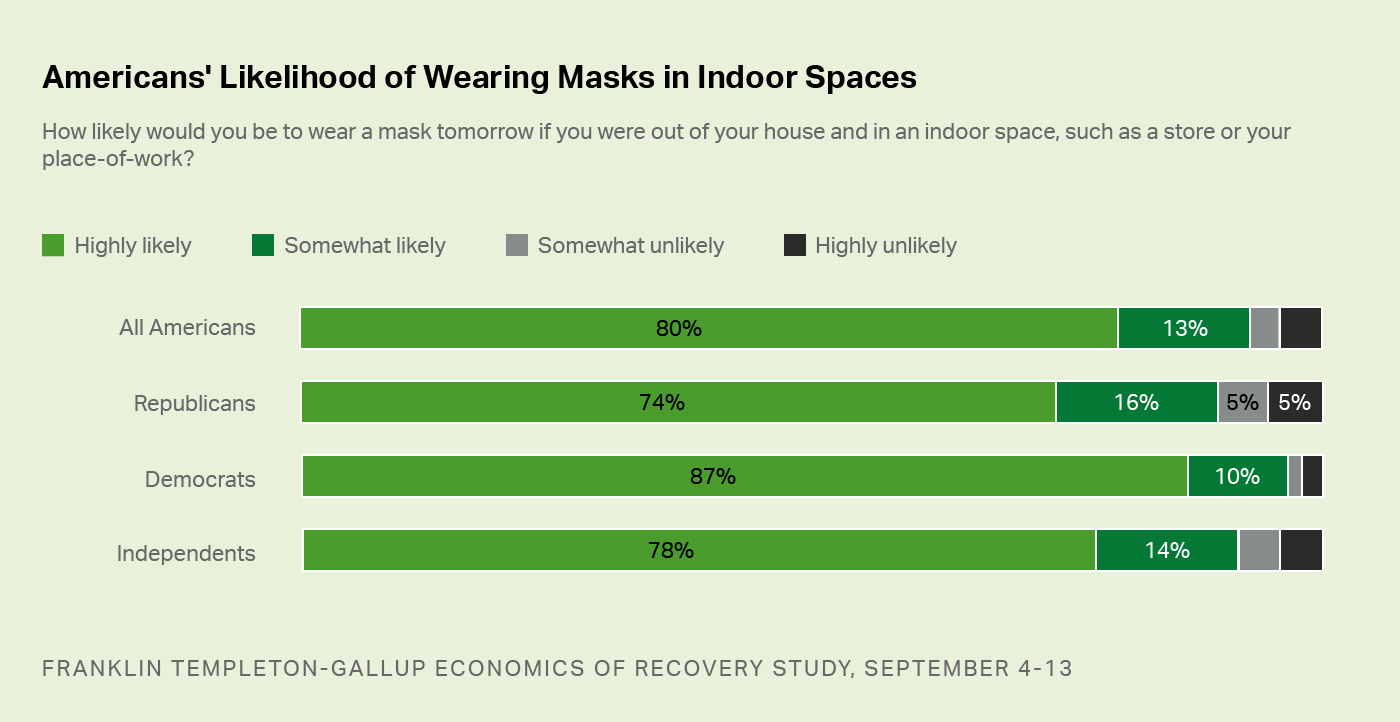
Bar graph: Eight in 10 Americans would be "highly likely" to wear masks tomorrow if out of the house and in an indoor space. 74% of Republicans, as well as 87% of Democrats and 78% of Independents would be "highly likely" to wear masks tomorrow if out of the house and in an indoor space.
Many mask-wearers likely feel they have little choice: 78% of Americans say their state or local government requires them to wear a mask in public. Among this group, 81% say they would be highly likely to wear a mask tomorrow if out of the house and in an indoor space. Even among those who do not live in states with such requirements, 78% say they would be highly likely to wear a mask.
Mask use does vary by age, but it is prevalent even among the youngest adults. Among Americans age 18 to 24, 63% say they would be highly likely to wear a mask tomorrow if outside their house and in an indoor space, while 24% say they would be somewhat likely to do so.
These results are based on more than 5,017 web-based surveys completed September 4-13 as part of the Franklin Templeton-Gallup Economics of Recovery Study. This study is conducted via an opt-in web panel. The sample has been adjusted statistically to ensure it represents key subgroups in their proper proportions of the U.S. adult population.
Americans Who Wear Masks in Public Less Likely to Have Misperceptions
More than any demographic, attitudinal or behavioral variable analyzed in the survey, Americans' demonstrated understanding of the coronavirus is predictive of mask use -- a key insight for public health officials. Most directly relevant to their likelihood to take precautionary measures is Americans' awareness that COVID-19 can be spread by people who are infected but show no symptoms. Overall, 69% of Americans say this is "definitely true," while 25% say it is "probably true," and 6% say it is probably or definitely false.
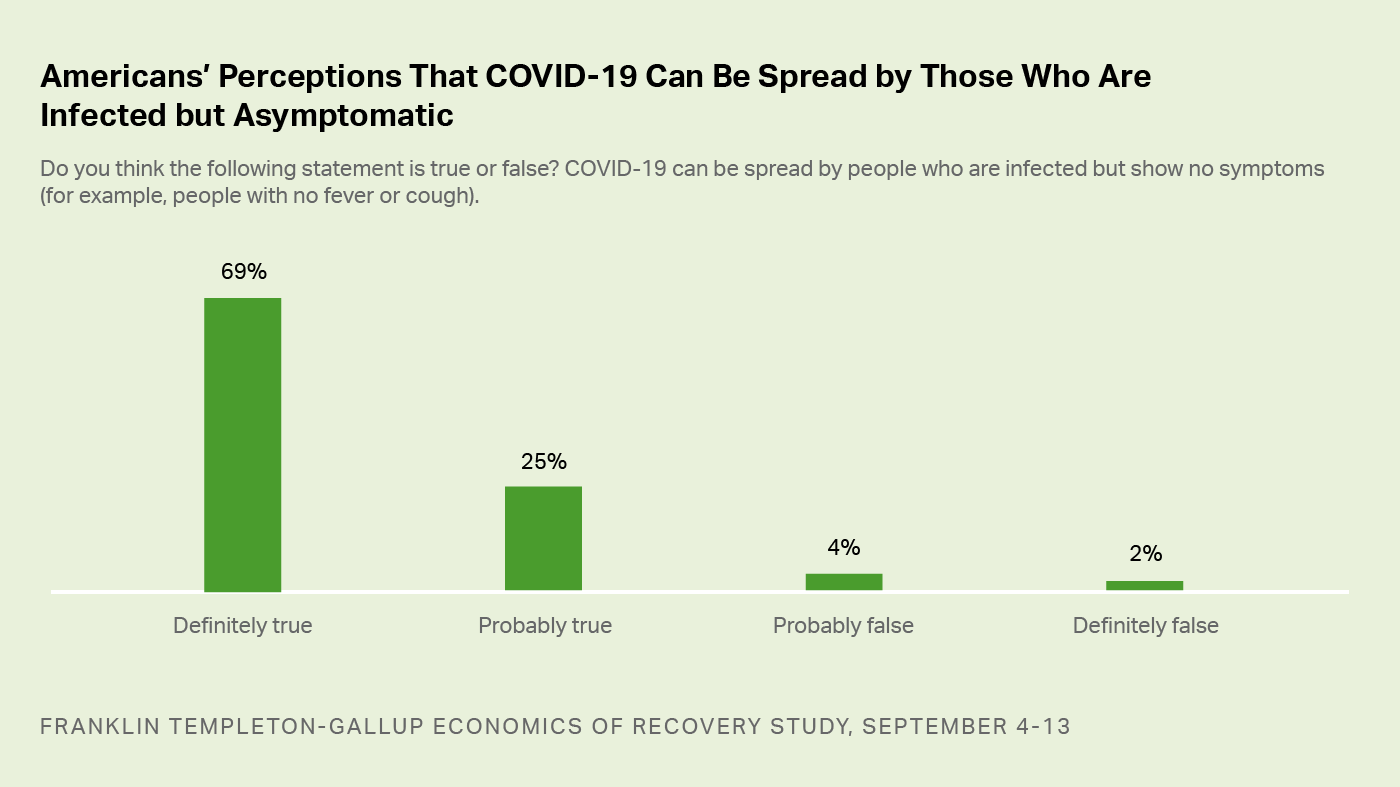
Bar graph: Seven in 10 Americans say it is definitely true that COVID-19 can be spread by infected people with no symptoms, while 2% say it is definitely false
Though a relatively small proportion of Americans say it is probably or definitely false that the coronavirus can be spread by infected people without symptoms, this belief is associated with a substantially lower likelihood to wear masks in public. Overall, 10% of Americans say they have not worn a mask when outside their home in the past seven days -- but this figure rises to 34% among those who believe asymptomatic transmission is false.
Americans who do not believe COVID-19 can be spread by people who do not show symptoms are significantly less likely to wear masks in public.
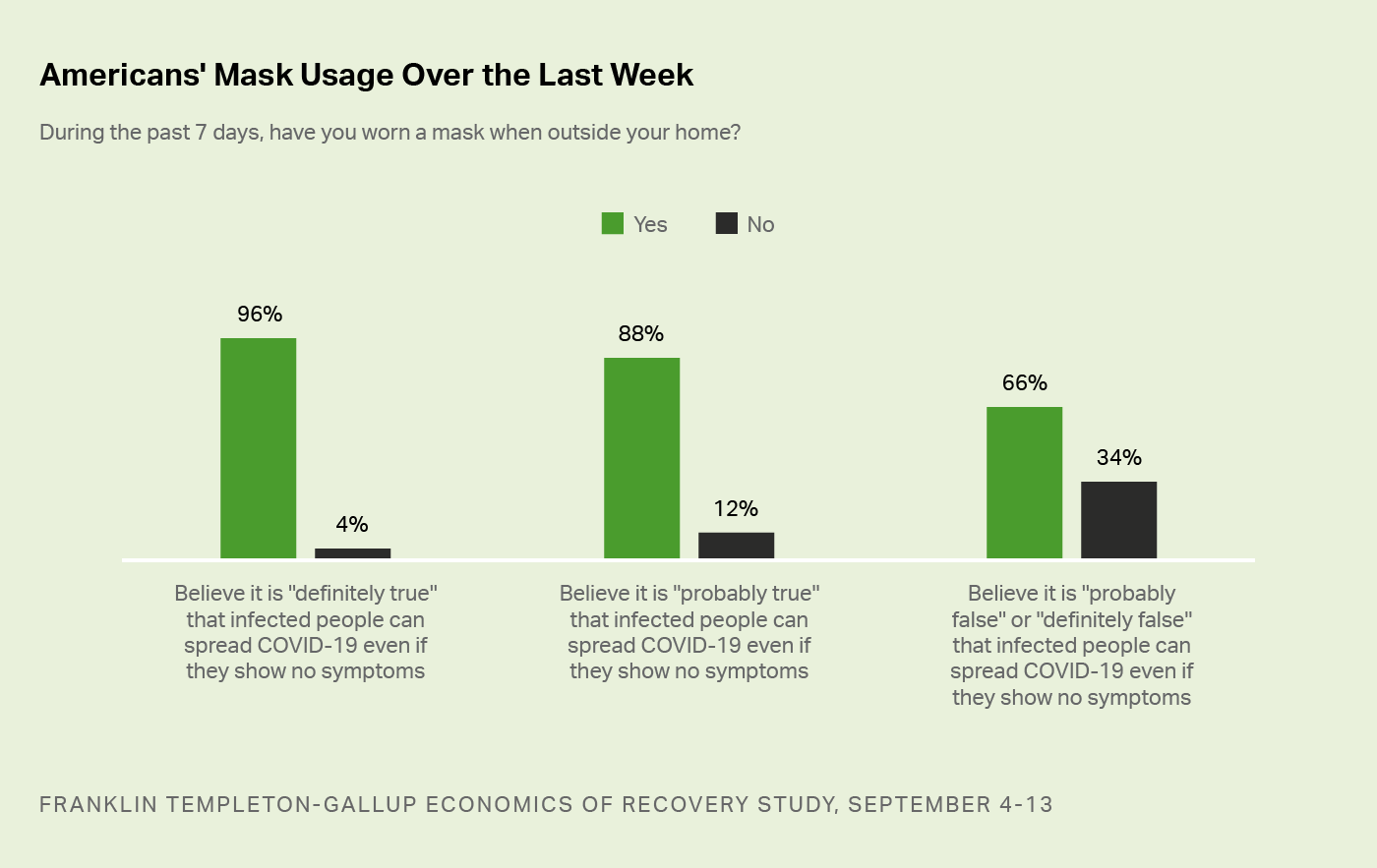
Bar graph. Americans usage of face masks over the last seven days. 96% of those that say that COVID-19 can be spread by asymptomatic individuals is definitely true have worn masks. 88% of those that say that COVID-19 can be spread by asymptomatic individuals is probably true have worn masks. 68% of those that say that COVID-19 can be spread by asymptomatic individuals is probably or definitely false have worn masks
Even among those who live in states that require mask use in public, 32% of those who believe it is probably or definitely false that COVID-19 can be transmitted by infected people with no symptoms say they have not worn masks outside the home in the past seven days.
Americans are also somewhat less likely to wear masks if they mistakenly believe that COVID-19 has caused fewer deaths in the U.S. this year than the flu and traffic accidents. For example, 87% of those who believe the flu has caused more deaths have worn masks outside the home in the past seven days, vs. 95% of those who know COVID-19 has caused more deaths. (The CDC estimates that 34,200 Americans died of flu-related causes in the 2018-2019 flu season, and the National Highway Traffic Safety Administration estimates that 36,120 Americans died in motor vehicle traffic crashes in 2019. By contrast, more than 200,000 Americans have died from coronavirus-related causes so far in 2020).
| Yes, wore a mask | |||||||||||||||||||||||||||||||||||||||||||||||||||||||||||||||||||||||||||||||||||||||||||||||||||
|---|---|---|---|---|---|---|---|---|---|---|---|---|---|---|---|---|---|---|---|---|---|---|---|---|---|---|---|---|---|---|---|---|---|---|---|---|---|---|---|---|---|---|---|---|---|---|---|---|---|---|---|---|---|---|---|---|---|---|---|---|---|---|---|---|---|---|---|---|---|---|---|---|---|---|---|---|---|---|---|---|---|---|---|---|---|---|---|---|---|---|---|---|---|---|---|---|---|---|---|
| % | |||||||||||||||||||||||||||||||||||||||||||||||||||||||||||||||||||||||||||||||||||||||||||||||||||
| COVID-19 has caused more deaths than flu | 95 | ||||||||||||||||||||||||||||||||||||||||||||||||||||||||||||||||||||||||||||||||||||||||||||||||||
| Flu has caused more deaths than COVID-19 | 87 | ||||||||||||||||||||||||||||||||||||||||||||||||||||||||||||||||||||||||||||||||||||||||||||||||||
| COVID-19 has caused more deaths than traffic accidents | 94 | ||||||||||||||||||||||||||||||||||||||||||||||||||||||||||||||||||||||||||||||||||||||||||||||||||
| Traffic accidents have caused more deaths than COVID-19 | 89 | ||||||||||||||||||||||||||||||||||||||||||||||||||||||||||||||||||||||||||||||||||||||||||||||||||
| FRANKLIN TEMPLETON-GALLUP ECONOMICS OF RECOVERY STUDY, September 4-13 | |||||||||||||||||||||||||||||||||||||||||||||||||||||||||||||||||||||||||||||||||||||||||||||||||||
Americans Who Do Not Wear Masks Also More Likely to Report Negative Reactions From Family and Friends
The current results also suggest Americans who do not wear masks in public may face social consequences. Overall, two in 10 adults (20%) say they have experienced negative social reactions from friends or family members because of their personal choices related to the coronavirus; however, this figure rises to about three in 10 (29%) among those who say they have not worn masks in public in the past seven days.
Notably, the gap is even wider and nearly identical among members of the two major political parties. However, Americans who are not affiliated with either major party are less likely overall to say they have experienced negative reactions because of their coronavirus choices; they show little difference between those who have and have not worn masks outside the home in the past week.
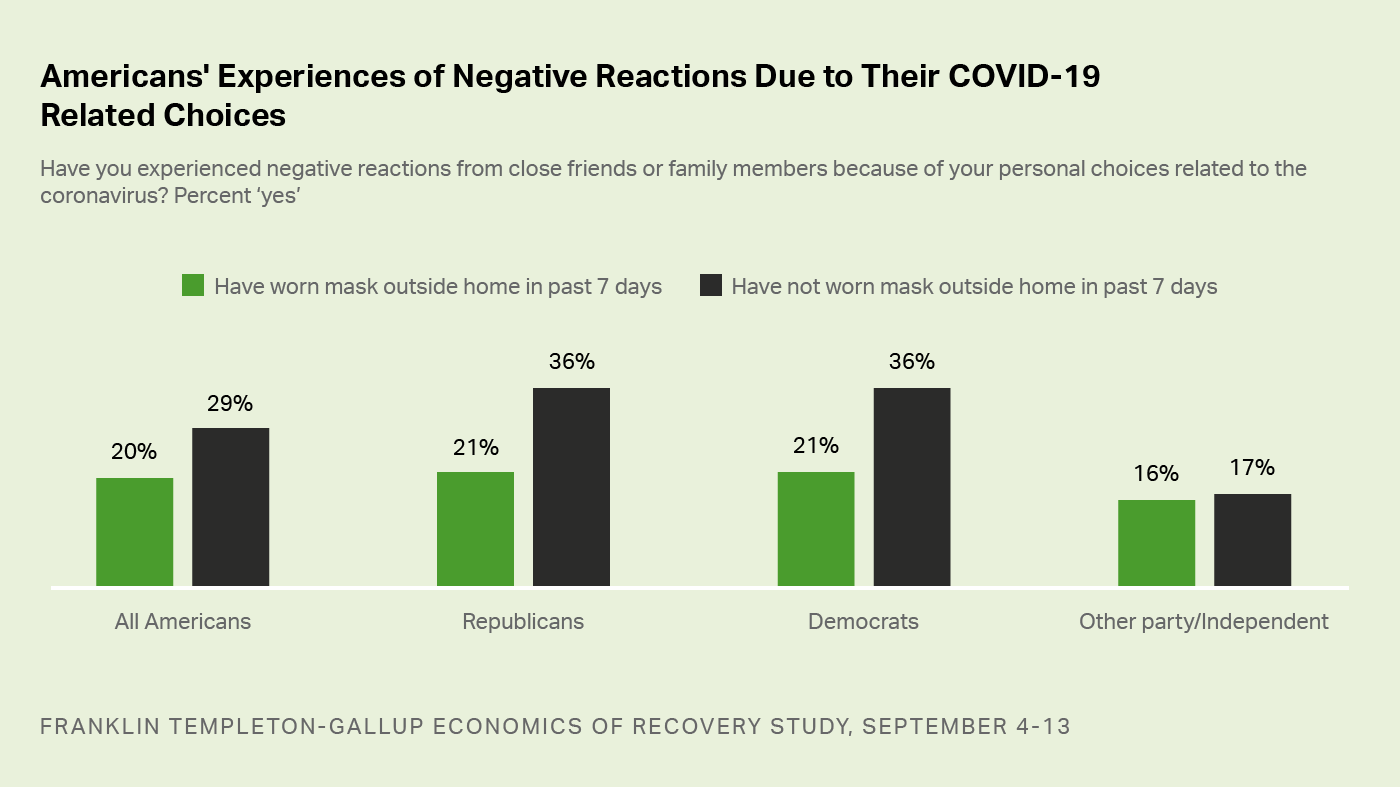
Bar graph: Americans who do not wear masks in public more likely to have experienced negative reactions because of coronavirus choices. 20% of Americans who have negative reactions from close friends or family due to their personal COVID-19 choices wore masks within the last week, while 29% have not.
Implications
Over the course of the COVID-19 crisis, media reports have periodically highlighted behaviors among certain social or demographic groups -- particularly young adults -- suggesting they are less likely than others to take coronavirus precautions seriously. However, results from the last Gallup/FT survey offer evidence that the most important factor in Americans' decision to do so is exposure to accurate information about the pandemic from sources they trust.
Researchers have noted that this is the first pandemic of its kind in the era of social media, creating unprecedented communication challenges for public health officials. Rather than focusing solely on reaching all Americans with information about the crisis, officials must now also concern themselves with countering false information and helping Americans distinguish between reliable and unreliable sources of information online. More than ever before, public health officials must understand the media habits of specific population groups in order to tailor messages that actively fill knowledge gaps and counter myths in order to save lives.
To receive ongoing updates about findings from the Franklin Templeton-Gallup Economics of Recovery Study, please sign up here. To read the project announcement press release, please visit this page.
